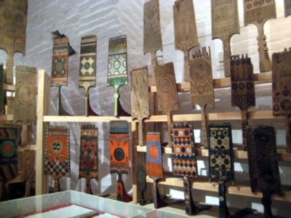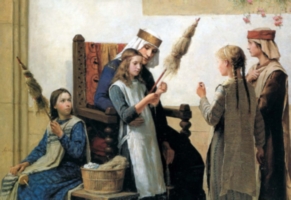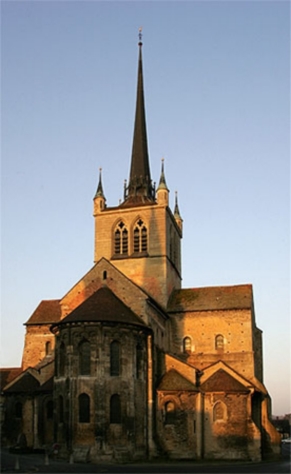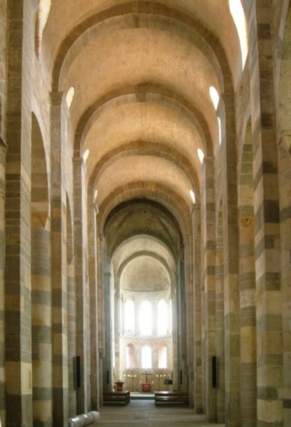Leviticus 231/84: Distaff or Roc ...back to work today!
...before the men next Monday, Plough Monday? It gets its name from the reality that after Christmas and Epiphany it's back to work with the spindle and the distaff for the women. A distaff also called a rock is a tool used in spinning and designed to hold the unspun fibres keeping them untangled and thus easing the spinning process. It is most commonly used to hold flax, and sometimes wool, but can be used for any type of fibre. The fibre is wrapped around the distaff, and tied in place with a piece of ribbon or string. The word comes from dis in Low German meaning a bunch of flax connected with staff. In some Northern European languages the term roc or rock is used. The spinning process has attracted some fascinating images and distaffs were a prized woman's possession as shown in the illustration of a Russian collection.
 
La Reine Berthe et les Fileuses is the second image …. Albert Anker’s painting from 1888 shows Queen Bertha of Burgundy (907-966) teaching three girls who are presumably children within the Royal Court to spin using distaffs. It's been generally interpreted as nostalgia for artisanal work before the Industrial Revolution. The significance of a long thread dispensed by the three Fates is presumed to be appropriate for a Queen who somehow survived two marriages at a time when reaching the age of thirty was quite an achievement. She lived to be 59. She had a fascinating career which began when she became Queen to to King Rudolph II of Burgundy after her father the Duke of Swabia had made peace with Burgundy cementing that peace with Bertha's marriage in 922. Back in the 10th century, Payerne was part of the mighty Kingdom of Burgundy, which encompassed both sides of the Jura mountain range, and where kings waged war in a bid to expand their empire and reign supreme. Together they reigned over the Lombard Kingdom from their base in Pavi during which time Bertha bore the king three children - Conrad the Peaceful, Adelaide, future Empress of Germania, and Rudolf who would later become the ruler of Alsace. Rudolf II himself was killed in 926 in battle fending off a hostile invasion by the Onogurs, a nomadic Hungarian tribe. The 2nd King of Italy, Hugh of Arles, immediately spotted an opportunity to expand his realm by marrying Bertha, now left to raise her children alone in a court beset by power struggles and intrigue, and they finally wed in 930. With Conrad as his heir, Hugh betrothed his own son Lothair to Adelaide, Conrad’s sister, much to the indignation of other bellicose monarchs. King Otto I of Germania in particular realised that a reunified kingdom of Italy would present a major threat and promptly abducted Conrad who grew up a prisoner of the German court. And King Otto I would himself later marry Adelaide, by then Lothair’s widow, who thus became the first Empress of the German Empire. During these troubled times Queen Bertha went to the site of modern-day Payerne Priory in search of sanctuary from these machinations of her Court and her own husband’s serial adultery. But the wars had left deep scars and Saracen pirates continued to torment the local peasants who fought back as best they could. Queen Bertha decided that something must be done and raised an army to drive out the Spanish marauders once and for all and called on the Benedictine monks of Cluny to rebuild their monastery and teach the women how to spin wool so that they could have a much-needed source of income. From then the legend was born: surveying her domain on horseback, threading her distaff and doing good works. Even in the 21st century stories of "the good old days of Queen Bertha" are still retold. In later life Queen Bertha sent for Adelaide, by then Empress of Germania, and told her what needed to be done to safeguard the future of the Payerne Priory as well as the other monasteries she had supported. In her famous will she enjoined her daughter and the monks to complete the magnificent Cluniac Priory she had founded. Today it lies in modern Switzerland.
The Reformation led to the dissolution of the monastery and the nearby cities of Bern and Fribourg began to exercise influence in Payerne and on the Priory. Protestant Bern supported a small community of Reformed citizens while Catholic Fribourg declared itself the guardian of the monastery. Bern won the upper hand and in 1536 they dissolved the Priory and acquired the monastery as well as a portion of its rights and property. Fribourg took in the monks and other Catholic believers. Some of the Priory buildings were demolished and the remainder put to various secular uses: a bell foundry in the 17th century, a grain store in the 18th and later as a prison and barracks. However sanity returned in the end and for its exceptional cultural value restoration began in 1926.
 
Other meaning of distaff. Because of its association with women the word distaff has been used to represent female ancestry and in the US in particular mares - with exclusive Classic Races given the name. Our distaff hereabouts came home after a blustery walk around the church and back to announce that the wind was taking her breath away; and she had equal grounds for complaint at Tescos Click & Collect conducted at -1 degree. Frost stayed on the lawns all day. More distaffs in Kentucky were the factitious heroines of the outdoor library service provided there under Roosevelt's New Deal until 1943. The Giver of Stars is a great read [just finished] that Laura gave us for Christmas by Jojo Moyes - who never ceases to surprise with the locations for her well researched novels. Our evening concluded with overgenerous helpings of media and political unctuous virtue speaking 'remorse and outrage' at the occupation of the Capitol in Washington DC by The Donald's supporters. These hypocritical messages about democracy and accepting the votes of the majority come from the media and politicians' mouths that had opposed Trump's election in 2016 and subsequently at every turn; and back here in the UK from those who had done everything to seek to overturn the Brexit decision of the British people. So, Uncle Joe Biden has a challenge but, with a favourable wind from the ending of the pandemic, the US could see good economic times return again sooner than many think.
I say the evening concluded thus … but of course the welcome tv return of escapist Death in Paradise had already lifted our spirits at 9pm and there are promises of Would I Lie to You and Not Going Out coming shortly … the world is a wonderful place …. and there's a new right of centre tv and radio channel being launched shortly too ….
Published Date: January 7th 2021
|





